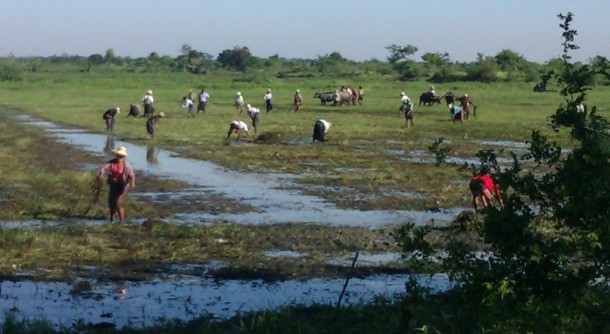Villagers in Pegu Division’ s Prome District on Tuesday began to farm about 470 hectares of land that was taken from them about a decade ago, when an agro-industrial firm seized their village lands, a local farmer and activist said, adding that local police had immediately warned them to stop.
Ohn Han said about 150 farmers from eight villages in Thegon Township gathered to prepare the fallow land for rice cultivation, adding that ever since a company called Cooperative Three Ltd illegally grabbed their land villagers had fallen into poverty.
“We had almost no land left—not even to grow rice for ourselves—after the Cooperative Three Ltd seized 1,160 acres [470 hectare] of our farmlands in 2000 and 2001,” said Ohn Han, who is from Aungkone village.
Cooperative Three Ltd, also known as Thama 3 in Burmese, is reportedly owned by businessman Htai Htai, who villagers claim is a Chinese national.
Soon after farmers began clearing the land on Tuesday morning, local police arrived and ordered them to leave as they were on company land.
“We told them [the police] that we are ready to face any prosecution if they charge us with trespassing on these lands,” Ohn Han said.
The farmers had landownership documents dating back to 1983, he claimed, adding, “We explained to the police that we work on the old fields because we are still the owners of the land, according to these documents.”
Local farmers’ activist Min Min told The Irrawaddy that Thegon Township police told villagers to leave the land and write a letter to authorities instead.
“Police said that if the farmers actually own the land, they can submit the letter formally,” he said, adding that they had done so in March and August last year and also staged a local protest in July.
However, local authorities and Cooperative Three Ltd ignored the complaints, he said, adding that affected families had never received any sort of compensation for the loss of land.
Min Min said companies and retired military officers had illegally grabbed land in many local villages since the 1990s, adding that they had targeted the land due to the presence of a local dam, which ensures year-round water supply.
Confiscation of farmland was a widespread problem in Burma under the military regime and continues throughout the country. Affected communities often get no prior warning or compensation for land lost. Under military rule, authorities dealt harshly with any local dissent against land-grabs.
Recently however, farmers have become bolder in their protests after learning about President Thein Sein reform agenda, which includes respect for human rights and land rights.
In July in Mandalay Division’s Wundwin Township, farmers rose up to reclaim lost land, but they quickly faced threats by local authorities and prosecution on charges of trespassing and defamation.

















